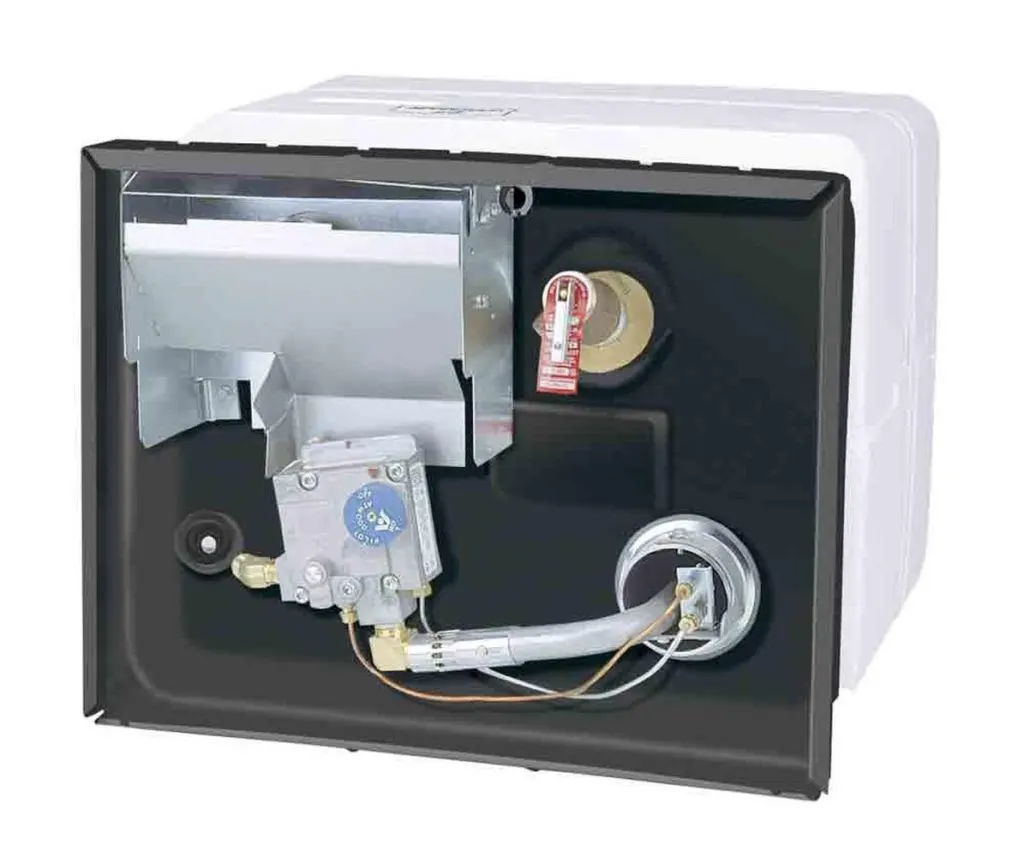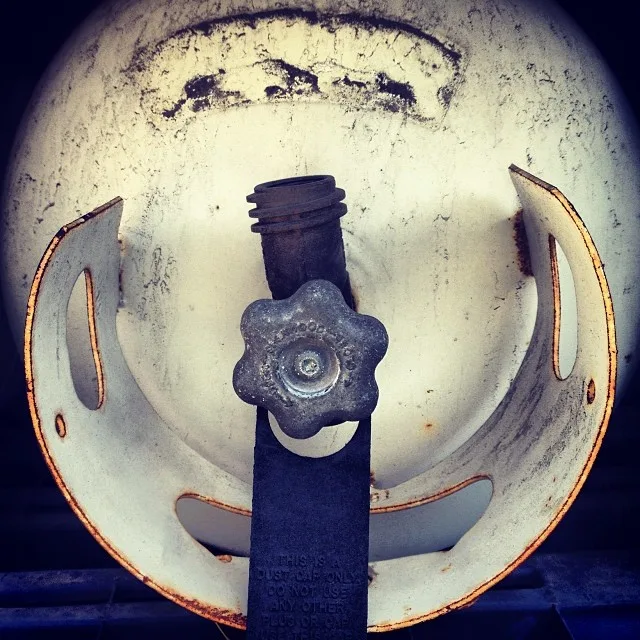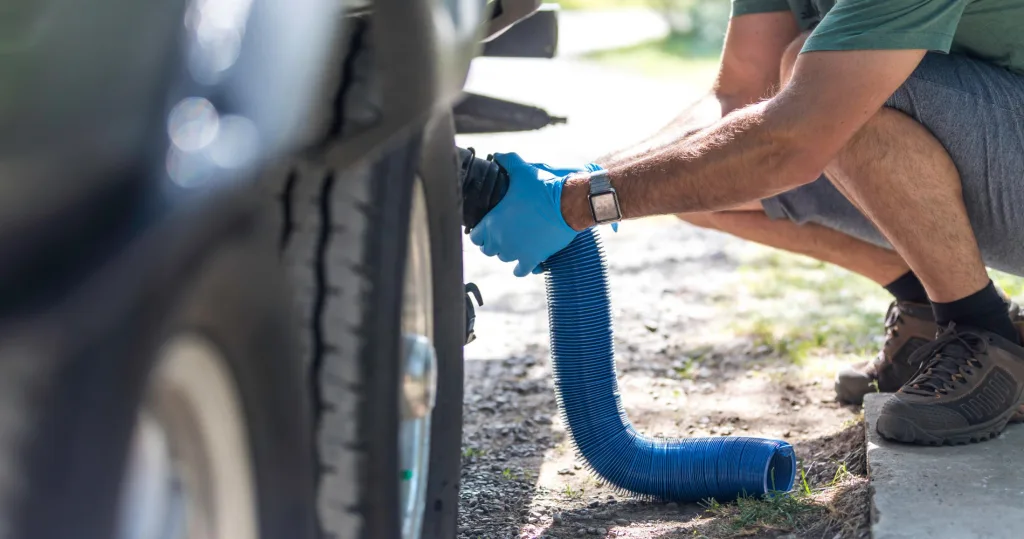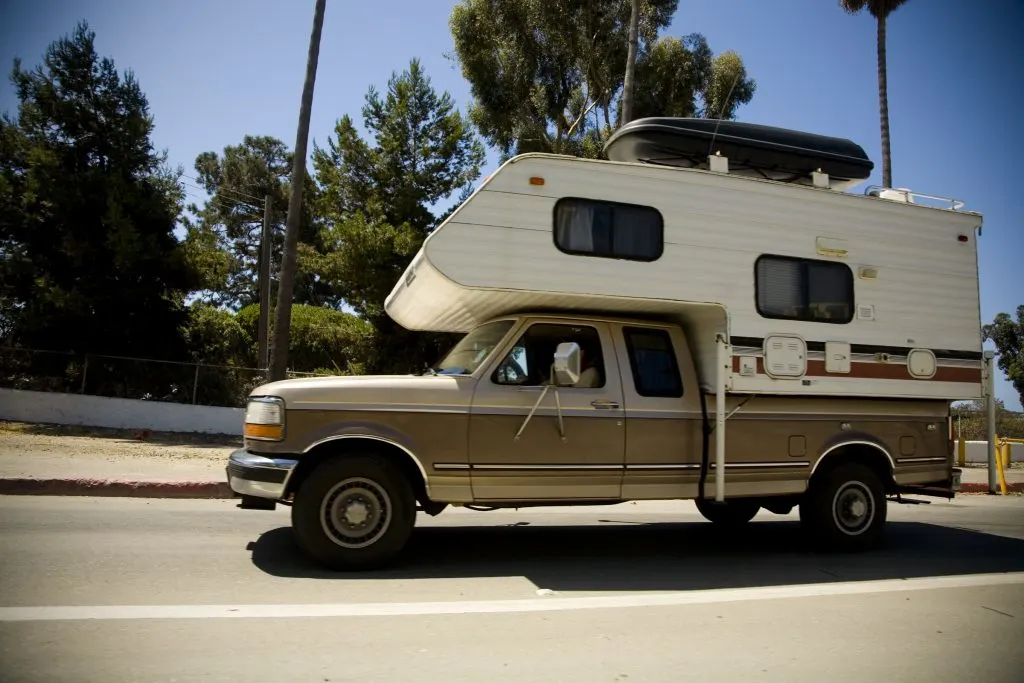There are few things more stressful than a bad smell in your RV.
If you’ve got an odor in your RV, escaping it in a small space is impossible. And how do you know if it’s dangerous or not?!
Today we’re sharing the most common RV odors. While we aren’t RV technicians, we have lived and traveled in our RV for five years. We’ve smelled many of these scents.
Sometimes a bad smell in the RV can be a perilous problem.
This article is a starting point to identify scents, not an instruction manual to solve them – make sure you quickly call a professional technician if you think the smell has a dangerous source.

Common RV Odors and How To Fix Them:
Throughout your RV ownership, you may encounter a variety of odors in your RV. Here are the most common types of RV odors, what causes them, and how to fix some of them.
Rotten egg Odor in RV
Does your RV smell like rotten eggs? There are a couple causes to a rotten egg smell in an RV.
The first place to look for a rotten egg odor is your hot water heater. This is a very common issue in RVs. When the anode rod in the RV water heater reacts with bacteria in the water, it creates this smell.
How to fix it: Clean out your water heater and change the rod.

The next culprit could be your RV batteries. If a lead-acid battery is overcharged, it will produce a gas that smells like rotten eggs. This gas is flammable and hazardous to human health.
Batteries can quickly become dangerous and may cause harm to your RV or nearby people.
I would be calling for professional help ASAP for this issue since I have minimal electrical experience.
Batteries will probably have to be replaced.
Lastly, if you smell rotten eggs in your camper and it isn’t either of the above… check your propane system! Propane has a very strong odor that is comparable to rotten eggs. If you smell this and it’s not from your water heater or batteries, you may have a propane leak. This is very dangerous.

Again, this is an issue for immediate attention and you need to call a professional.
Turning off your propane system and ventilating the RV is ideal. Removing yourself from the area will keep you out of harms way from the propane.
Contact an RV tech right away to check your entire propane system. Do not allow any sparks or flame near the camper at all – not even a cigarette!
Sewage Smell In RV
If your RV smells like sewage… it’s probably exactly that: sewage!
The smell of sewage in your RV could be coming from your black tank, your gray tank, or your drains.
If the smell is coming from your black tank, it could be from a broken or worn down seal on your toilet. RV toilets have a rubber gasket that seals them from the black tank. These gaskets are to prevent odors from coming into the RV, but they fail from time to time.
Note: It is normal to smell a bit of black tank odor when flushing the toilet. To combat this, be sure that your roof vent fan is OFF when you flush the toilet! Also, using a holding tank deodorizer can help.
But, if you have a sewage odor that permeates the RV and doesn’t go away, you may have a problem.
How to fix it: Test your toilet to see if it holds water. If not, the seal no longer works and needs to be replaced. You can find an RV toilet gasket online or at most RV supply stores.
Your gray tank can become really stinky, too! Even though gray water isn’t raw sewage, it still smells bad.
You will notice a stinky gray tank odor when your gray tank becomes full, or if your drains are dirty.
How to fix it: Dump your gray tank and clean the drains.

Ammonia Odor in RV
If you smell ammonia in your RV, it’s highly likely that your RV fridge is the culprit. It is dangerous to breathe in ammonia, so this odor should be taken seriously!
Unfortunately, if your RV refrigerator smells like ammonia, it isn’t an easy fix.
Turning off the fridge and ventilating the RV may be the best first step.
For me and my RV, contacting the nearest RV technician is the best solution. The cooling unit will likely need to be replaced.
Musty, Mildew Smell in Camper
A musty odor is a very common occurrence in campers, especially ones that have been stored for any amount of time. RVs are notorious for holding in moisture and humidity. This kind of an environment is where mold thrives!

A musty smell in a camper could be caused from mold growing due to lack of ventilation or water damage. Water damage is caused by rain or leaks in the plumbing.
How to Fix It: First, check your RV for visible signs of mold. Mold can be cleaned and treated with bleach. Common areas of mold growth in RVs are along the tops of the wall near the ceiling, in cabinets, closets, and under the RV mattress.
Check your RV for potential water damage by feeling for soft spots in the ceiling, wall, and floor.
Here’s where water damage will show up first.
Other Possible Causes of Strange Smells in Your RV
The odors listed above are the most common causes of weird smells in an RV, but they aren’t the only ones!
- Rodents: rodents can cause a big stink in your RV if they get stuck and die in a wall, or have a large nest with droppings. Here are the best ways to keep rodents out!
- Bugs: some bugs can cause odors in your RV – like stink bugs!
- Spoiled Food: Of course spoiled food smells bad… but I’m sure this is the first thing you checked.
- Mechanical or Electrical Issues – An RV is a house AND a vehicle all in one. Some odors may be caused by mechanical or electrical issues (like a burning plastic smell), so be vigilant!

Tips for Keeping Your RV Smelling Fresh
There are always the general tips to keep a home smelling fresh, like keeping it clean or putting baking soda in the fridge. Here are some tips specific to keeping your RV smelling good:
- Air out often. RVs don’t have great ventilation, and humidity combined with stale air can cause some funky odors. Open your windows and run your roof vents, even if just for 5-10 minutes a day.
- Use RV dehumidifiers or desiccants for moisture. Moisture is a constant battle in an RV, and it can cause health issues if not addressed. Travel to a dryer area, ventilate your RV while it’s in storage, and use dehumidifiers to battle the moisture.
- Keep tanks and drains clean. Proper holding tank, drain, and gasket maintenance is just another RV chore you may not have thought of before. In addition to dumping your tanks, they should be rinsed with fresh water until they run clean. Use holding tank deodorizer and/or enzymes to help break down waste. Also, keep those drains clean!
If you want to know what RV system will break first, here’s some insight from an RV mechanic.
Hopefully now you’ve identified the source of your RV’s funk and can move on to more important things… like enjoying RV life!
Take a deep breath of fresh air and relax, you’ve earned it.
Discover the Best Free Camping Across the USA
To be honest with you, we hate paying for camping. There are so many free campsites in America (with complete privacy).
You should give it a try!
As a matter of fact, these free campsites are yours. Every time you pay federal taxes, you’re contributing to these lands.
Become a FREE CAMPING INSIDER and join the 100,000 campers who love to score the best site!
We’ll send you the 50 Best Free Campsites in the USA (one per state). Access the list by submitting your email below:
Love getting your blog every day. Lot of good info. I’m sure it is a lot of work, but you are helping a lot of people with your info..with so many new people RVing, it is nice to have somewhere to look for help! Thanks!
Happy Campers Black Tank chemical can no longer be sold in California. What has been proven to be the best brand available in California.
Thanks,
Toxic smell from high VOC’s